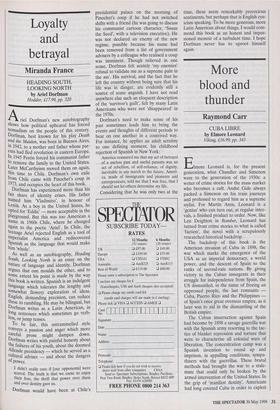Loyalty and betrayal
Miranda France
HEADING SOUTH, LOOKING NORTH by Ariel Dorfman Hodder, £17.99, pp. 320
NIL
Ariel Dorfman's new autobiography shows how political upheaval has forced nomadism on the people of this century. Dorfman, best known for his play Death and the Maiden, was born in Buenos Aires, in 1942, to a mother and father whose par- ents had fled revolution in eastern Europe. In 1945 Peron forced his communist father to remove the family to the United States. Later McCarthyism moved them on again, this time to Chile. Dorfman's own exile from Chile came with Pinochet's coup in 1973, and occupies the heart of this book. Dorfman has experienced more than his fair share of identity crises. His father named him 'Vladimiro', in honour of Lenin. As a boy in the United States, he opted for 'Eddie' — more acceptable in the Playground. But this was too American a name in 1960s Chile, where he changed again to the poetic 'Ariel'. In Chile, the teenage Ariel rejected English as a tool of imperialist America and rediscovered Spanish as the language that would make him 'whole'.
As well as an autobiography, Heading South, Looking North is an essay on the nature of language and identity. Dorfman argues that one moulds the other, and to some extent his point is made by the way this book is written. Spanish is an indulgent language which tolerates the lengthy and somewhat flowery exploration of ideas. English, demanding precision, can reduce these to rambling. He may be bilingual, but Dorfman writes as a Latin American, in tong sentences which sometimes go verb- less, or jump tenses. To be fair, this untrammelled style conveys a passion and anger which more careful prose might dampen down. Dorfman writes with painful honesty about the failures of his youth, about the doomed Allende presidency — which he served as a cultural adviser — and about the dangers of power.
I didn't really care if [our opponents] were scared. The truth is that we came to enjoy their fear, the thrill that power over them and over destiny gave us.
Dorfman would have been at Chile's presidential palace on the morning of Pinochet's coup if he had not switched shifts with a friend (he was going to discuss his communist cartoon character, 'Susan the Seed', with a television executive). He was not declared an enemy of the new regime, possible because his name had been removed from a list of government advisers by a colleague who realised a coup was imminent. Though relieved in one sense, Dorfman felt acutely 'my enemies' refusal to validate me as a supreme pain in the ass'. His survival, and the fact that he left the country without being sure that his life was in danger, are evidently still a source of some anguish. I have not read anywhere else such an eloquent description of the 'survivor's guilt', felt by many Latin Americans who were not 'disappeared' in the 1970s.
Dorfman's need to make sense of his past sometimes leads him to bring the events and thoughts of different periods to bear on one another in a contrived way. For instance, he applies an adult scrutiny to one defining moment, his childhood rejection of Spanish in New York:
America reassured me that my act of betrayal of a useless past and useful parents was an act of rebellion, of self-reliance, of dignity, inevitable in any march to the future. Ameri- ca, made of immigrants and pioneers and entrepreneurs, told me that I was free, that I should not let others determine my life.
Considering that he was only two at the time, these seem remarkably precocious sentiments, but perhaps that is English cyn- icism speaking. To be more generous, more Latin American about things, I would com- mend this book as an honest and impas- sioned memoir of a turbulent time. I hope Dorfman never has to uproot himself again.


































































 Previous page
Previous page